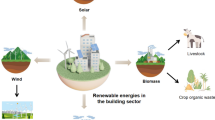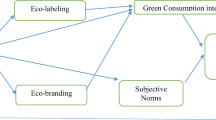Abstract
The heating energy-saving behavior of residents in the hot summer and cold winter area is crucial to reduce heating energy consumption and carbon emissions. In this paper, the theory of planned behavior is used to explore the influence of social psychological factors on residents’ energy-saving intention and behavior. Data are collected using a questionnaire survey method and analyzed using a structural equation model. The results show: (1) Personal energy-saving attitude and subjective norm have positive effects on individual’s intention to save heating energy; (2) personal energy-saving attitude and subjective norm have positive effects on purchase-related heating energy-saving behavior and habitual-related heating energy-saving behavior through the mediating effect of heating energy-saving intention; (3) perceived behavioral control and descriptive norm have no significant effects on intention and behavior; (4) subjective norm is the most sensitive variables in predicting individual’s intention to save heating energy.

Similar content being viewed by others
References
Ajzen I (1991) The theory of planned behavior. Organ Behav Hum Decis Process 50(2):179–211
Alzahrani AI, Mahmud I, Ramayah T et al (2016) Extending the theory of planned behavior (TPB) to explain online game playing among Malaysian undergraduate students. Telemat Inf 34:239–251
Chen MF (2016) Extending the theory of planned behavior model to explain people’s energy savings and carbon reduction behavioral intentions to mitigate climate change in Taiwan—moral obligation matters. J Clean Prod 112(3):1746–1753
Chen H, Xue T (2010) The model of elaborated social identity as the latest development of the collective behavior theories. Nankai J (Philos Lit Soc Sci Edn) (6):77–83 (in Chinese)
Chen CF, Xu X, Frey S (2016) Who wants solar water heaters and alternative fuel vehicles? Assessing social–psychological predictors of adoption intention and policy support in China. Energy Res Soc Sci 15:1–11
Claudy MC, Michelsen C, O’Driscoll A (2011) The diffusion of microgeneration technologies—assessing the influence of perceived product characteristics on home owners’ willingness to pay. Energy Policy 39(3):1459–1469
Cui Y, Yan D, Chen CF (2017) Exploring the factors and motivations influencing heating behavioral patterns and future energy use intentions in the hot summer and cold winter climate zone of China. Energy Build 153:99–110
Delzendeh E, Wu S, Lee A et al (2017) The impact of occupants’ behaviours on building energy analysis: a research review. Renew Sustain Energy Rev 80:1061–1071
Ding YX (2017) Analysis of spatiotemporal variations of household energy consumption in China. Lanzhou University, Lanzhou (in Chinese)
Donald IJ, Cooper SR, Conchie SM (2014) An extended theory of planned behaviour model of the psychological factors affecting commuters’ transport mode use. J Environ Psychol 40:39–48
Duan WT, Jiang GR (2008) A review of the theory of planned behavior. Prog Psychol Sci 2:315–320 (in Chinese)
Fishbein M, Ajzen I (1975) Belief, attitude, intention and behaviour: an introduction to theory and research. Philos Rhetor 41(4):842–844
Gao L, Wang S et al (2017) Application of the extended theory of planned behavior to understand individual’s energy saving behavior in workplaces. Resour Conserv Recycl 127:107–113
Guo S, Yan D, Peng C et al (2015) Investigation and analyses of residential heating in the HSCW climate zone of China: status quo and key features. Build Environ 94:532–542
Horne C, Kennedy EH (2017) The power of social norms for reducing and shifting electricity use. Energy Policy 107:43–52
Hu S, Yan D, Cui Y et al (2016) Urban residential heating in hot summer and cold winter zones of China—status, modeling, and scenarios to 2030. Energy Policy 92:158–170
Jun J, Arendt SW (2016) Understanding healthy eating behaviors at casual dining restaurants using the extended theory of planned behavior. Int J Hosp Manag 53:106–115
Kim J, Hong T, Jeong J et al (2017) Establishment of an optimal occupant behavior considering the energy consumption and indoor environmental quality by region. Appl Energy 204:1431–1443
Lafrance M, Jiang Y, Yan D, Dulac J, Guo S, Hu S et al (2015) Iea–Tsinghua joint paper: building energy use in China. https://www.iea.org/publications/freepublications/publication/PARTNERCOUNTRYSERIESBuildingEnergy_WEB_FINAL.pdf
Leeuw AD, Valois P, Ajzen I et al (2015) Using the theory of planned behavior to identify key beliefs underlying pro-environmental behavior in high-school students: implications for educational interventions. J Environ Psychol 42:128–138
Lin B, Wang Z, Liu Y et al (2016) Investigation of winter indoor thermal environment and heating demand of urban residential buildings in China’s hot summer—cold winter climate region. Build Environ 101:9–18
Littleford C, Ryley TJ, Firth SK (2014) Context, control and the spillover of energy use behaviours between office and home settings. J Environ Psychol 40:157–166
Ma J, Hipel KW, Hanson ML et al (2018) An analysis of influencing factors on municipal solid waste source-separated collection behavior in Guilin, China by using the theory of planned behavior. Sustain Cities Soc 37:336–343
Mi LY, Gu M, Yang J et al (2016) Empirical research on the psychological motivation factors of urban residents, low carbon oriented energy consumption behavior in Xuzhou City. Resour Sci 38(4):609–621 (in Chinese)
Ouyang J, Hokao K (2009) Energy-saving potential by improving occupants’ behavior in urban residential sector in Hangzhou City, China. Energy Build 41(7):711–720
Park E, Sang JK (2017) What motivations drive sustainable energy-saving behavior?: an examination in South Korea. Renew Sustain Energy Rev 79:494–502
Prete MI, Piper L, Rizzo C et al (2017) Determinants of Southern Italian households’ intention to adopt energy efficiency measures in residential buildings. J Clean Prod 153:83–91
Ru X, Wang S, Yan S (2018) Exploring the effects of normative factors and perceived behavioral control on individual’s energy-saving intention: an empirical study in eastern China. Resour Conserv Recycl 134:91–99
Sapci O, Considine T (2014) The link between environmental attitudes and energy consumption behavior. J Behav Exp Econ 52:29–34
Sheeran P, Orbell S (1999) Augmenting the theory of planned behavior: roles for anticipated regret and descriptive norms. J Appl Soc Psychol 29(10):2107–2142
Shi X (2015) Application of best practice for setting minimum energy efficiency standards in technically disadvantaged countries: case study of air conditioners in brunei darussalam. Appl Energy 157(12):1–12
Sovacool BK (2014) What are we doing here? Analyzing fifteen years of energy scholarship and proposing a social science research agenda. Energy Res Soc Sci 1:1–29
Trotta G (2018) Factors affecting energy-saving behaviours and energy efficiency investments in British households. Energy Policy 114:529–539
Wang Z, Zhao Z, Lin B et al (2015) Residential heating energy consumption modeling through a bottom-up approach for China’s hot summer–cold winter climatic region. Energy Build 109:65–74
Wang B, Wang X, Guo D, Zhang B, Wang Z (2018) Analysis of factors influencing residents’ habitual energy-saving behaviour based on nam and tpb models: egoism or altruism? Energy Policy 116:68–77
Webb D, Soutar GN, Mazzarol T et al (2013) Self-determination theory and consumer behavioural change: evidence from a household energy-saving behaviour study. J Environ Psychol 35(35):59–66
Wells VK, Taheri B, Gregory-Smith D et al (2016) The role of generativity and attitudes on employees home and workplace water and energy saving behaviours. Tour Manag 56:63–74
Yu M, Wang CR, Liu Y et al (2018) Water and related electrical energy use in urban households—influence of individual attributes in Beijing, China. Resour Conserv Recycl 130:190–199
Yun GY (2018) Influences of perceived control on thermal comfort and energy use in buildings. Energy Build 158:822–830
Zeng L, Yu Y, Li J (2014) China’s promoting energy-efficient products for the benefit of the people program, in 2012: results and analysis of the consumer impact study. Appl Energy 133(C):22–32
Acknowledgements
The authors gratefully acknowledge the respected editors and the anonymous referees for their suggestions in this article. Special thanks are given to financial supports provided by the Major Special Fund for China University of Mining and Technology (2018WHCC05).
Author information
Authors and Affiliations
Corresponding author
Rights and permissions
About this article
Cite this article
Ding, Z.H., Li, Y.Q., Zhao, C. et al. Factors affecting heating energy-saving behavior of residents in hot summer and cold winter regions. Nat Hazards 95, 193–206 (2019). https://doi.org/10.1007/s11069-018-3489-3
Received:
Accepted:
Published:
Issue Date:
DOI: https://doi.org/10.1007/s11069-018-3489-3




